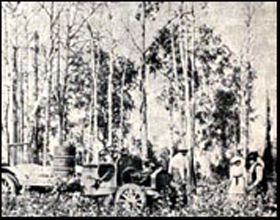Why was the University of Alaska originally located in Fairbanks?

Newcomers and visitors to the University of Alaska often ask, "Why was the university
originally located in Fairbanks rather than in Anchorage, Juneau, or some other more
southern Alaskan city?"
The most direct answer is that when the location of the university was selected in
1915, Anchorage was a tent city only a few months old; and the reason for its existence-—to
serve as headquarters for the construction of the Alaska Railroad —fully occupied
the attention of its pioneering residents. Juneau, the center of population, government,
and industry at the time, had little interest in having an agricultural college, since
southeastern Alaska's climate and geography were not favorable for farming.

Agricultural college? Yes, indeed. The University of Alaska began as the Agricultural
College and School of Mines under the same federal laws as similar land-grant colleges
throughout the continental United States.
Alaska was different in one respect, however. The location of its land-grant college
was selected by one man, rather than by its legislature. He was the legendary James
Wickersham, the foremost public figure on the Alaskan scene during the first third
of the 20th century.
Coming to Alaska as a federal judge in 1900, Wickersham earned early fame in bringing
law and order to Nome, as one of the founders of Fairbanks, and as Alaska's six-term
delegate to Congress, 1909-1921. In the 1914 election, his opponent, the Democratic
nominee for delegate, was a young Valdez lawyer, Charles E. Bunnell. Wickersham was victorious with 4,876 votes to Bunnell's 3,091.
History plays ironic tricks from time to time. It was Wickersham's bill in Congress
in 1915 which gave Alaska a land-grant college; it was his political opponent, Bunnell,
who became its founding president.
